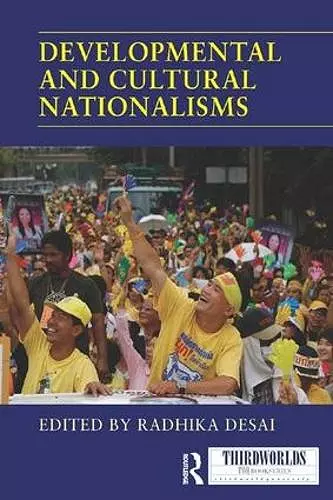Developmental and Cultural Nationalisms
Format:Paperback
Publisher:Taylor & Francis Ltd
Published:28th Feb '16
Currently unavailable, our supplier has not provided us a restock date
This paperback is available in another edition too:
- Hardback£150.00(9780415469289)

Premature announcements of the eclipse of nation states under 'globalization' and 'empire' stand exposed as the 21st century's first economic crisis underlines their continuing importance. A predominantly cultural study of nationalism was unable to resist the 'globalization' thesis. Focusing on selected Asian cases, this book argues that nationalisms have always contained political economies as well as cultural politics. Placing nation-states centrally in our understanding of modern capitalism, it challenges the 'globalization' thesis. Rather than eclipse, nations and nationalisms have undergone changes under the impact of neoliberalism since the 1970s.
Classical 20th century developmental nationalisms emphasised citizenship, economy and future orientations. Later cultural nationalisms - 'Asian values', 'Hindutva', 'Confucianism' or 'Nihonjiron' - stressed identity, culture and past orientations. Amid neoliberalism's flagrantly unequal political economy, not primarily concerned with material production or productivity, they glorified static conceptions of 'original' cultures and identities - whether religious, ethnic or other - and justified inequality as cultural difference. In contrast to the popular mobilizations which powered developmental nationalisms, cultural nationalisms throve on neoliberalism's disengagement and disenfranchisement, albeit partially compensated by the political baptism of newly enriched groups. Extremist wings of cultural nationalism in some countries were a function of this lack of popular support.
This book was published as a special issue of Third World Quarterly.
An illuminating book at the cross-roads of the end of an era and the beginning of another, argued with subtlety and with the intelligence needed to deal with very complex global issues, and coupled by a fascinating depth and breadth takes the reader in a global travel from China to America, and through Japan, India and a whole array of conflicting spaces in the world. A seminal book on issues pertaining to current nationalisms in the world.
Fernando de Toro, University of Manitoba
This set of new research essays by leading scholars of modern Asia and the Middle East, edited by Radhika Desai, will prove invaluable to restoring the link between the study of nationalism and political economy. Taken together they demonstrate the key distinction to be made between developmental and cultural nationalism. It is convincingly shown that nationalism is not merely imagined but socially produced by varying forces bent on the achievement of definite political and economic goals – progressive or otherwise.
Henry Heller, University of Manitoba
Nationalism paradoxically has always had an aspect of universality--the great national revolutions certainly were experienced as levers for transforming all of humanity. The collective imaginaries which today are redrawing the boundaries between communities are widely seen as transnational, no longer contained by state boundaries in their claim to actual universality. But are they? Radhika Desai brings to this enterprise her own profound insights into contemporary forms of cultural nationalism, and in her choice of contributors has succeeded admirably in clarifying the similarities and contrasts between the nationalisms of old and today.
Kees van der Pijl, Department of International Relations, University of Sussex
Cultural nationalism which stresses ethnic solidarity and the primordial origins of the nation has been resurrected in many countries. Developmental nationalism which stressed citizenship and the reduction of poverty has been neglected due to this revival of cultural nationalism. This excellent study in contrast of these two types of nationalism provides important insights into the political processes of present times.
Dietmar Rothermund, University of Heidelberg
This ground-breaking study, through linking cultural politics to the political economy of nationalism in various Asian locations, challenges orthodox assumptions about nationalism, modernity and neoliberalism. In the richness of its case studies and the originality of its approach, this collection should prove a valuable resource for anyone working within development, cultural, globalization and postcolonial studies.
Diana Brydon, Canada Research Chair in Cultural Studies and Globalization, University of Manitoba
The Beijing Olympics impressed us all that the era of neoliberal globalization did not destroy but rather re-intensified nationalism. In an exciting and original enterprise Developmental and Cultural Nationalisms explores this as a historical transition from the developmental nationalisms of the early postwar era into new cultural nationalisms. Why and with what socio-economic consequences? Covering a range of Asian countries, and uniting the study culture with that of political economy, this volume is a fresh and great contribution to the study of nationalism, Asian Studies and development studies!
Makoto Itoh, member of the Japan Academy, University of Tokyo
ISBN: 9781138967588
Dimensions: unknown
Weight: 530g
288 pages